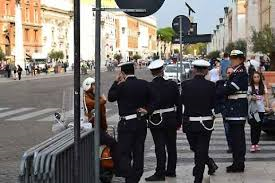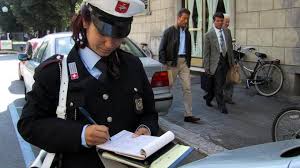City police brouhaha puts spotlight on an Italian malady – absenteeism
The Italian government and top authorities in Rome have vowed to take punitive action against the hundreds of city police – 83.5% of those on call – who did not show up for work on New Year’s Eve. Whether or not this will happen remains to be seen: in Italy, talk is cheap. But the unprecedented incident has refocused attention on one of Italy’s nagging problems, unflagging and illegal absenteeism among the ranks of civil servants that reportedly costs the country 30 million work-days and millions of euros in attempts to curtail it. Premier Matteo Renzi said this week that reforming the civil service was high on his list. “It is unacceptable that the reputation of honourable and hard-working public servants be muddied by slicksters and tricksters”, he said the other day.
According to statistics, the average Italian worker gets sick 2.3 times a year and stays home for an average of 17 plus days every year. Who knows how that compares with other countries but it certainly seems like a lot to me. When I was working for my Italian newspaper, I might have been sick 7 or 8 days a year, never more. But these figures are even worse among public administration workers, as Italians refer to the civil service, and the category most guilty of absenteeism, for the most part based on what may well be false doctors’ certificates, are the country’s police forces. (Interestingly enough, from this point of view the most virtuous state employees are Italy’ss magistrates, who not only get sick rarely but also often take less vacation time than the others).
What happened in Rome last week, basically a wildcat strike, appears, to have been set off by the city administration’s plans to restructure salaries, linking them more to performance and merit than they have been in the past. If I understand correctly, the Economy Ministry recently ruled that bonuses used by the previous Rome administration to boost the salaries of city police, whose functions are mostly traffic-related and administrative, were illegitimate. (They included supplements for street duty, supplements for shifts beginning after 5 p.m., and reimbursement for dry-cleaning costs for their uniforms). The new system, based on performance and merit, went into effect on January 1st.
Many among the 6000 city police corps reportedly are also angry at their new commander for deciding that in the future they should not spend more than five years in the same office or seven years (still too long) patrolling the same territory. But whatever the reason was, the behavior has been deemed unacceptable, as so it should.
Rome’s vigili do not have a good reputation. I do not know if the problem is that they are badly organized by their chiefs, if they are simply slackers, or it – as they claim – at 6000 plus the corps is seriously understaffed. Suffice it to say that they seem to do nothing to punish double-parking, driving while talking on a cellphone, or stopping the illegal peddlers who often seem to have taken over the city.
Abseenteism among civil servants has slowed somewhat in recent years thanks to actions taken by minister, Renato Brunetta, Minister for the Public Administration under Berlusconi from 2008 until 2011 and who put the cost of absenteeism to the Italian economy at 6.5 billion euros a year; he cut pay for civil servants during the first ten days of illness, stepped up requirements for home doctors’ visits and went after doctors providing false medical certificates.
Renzi’s plan for the future involves more of this and also considers transferring responsibility for checking up on people staying out of work for illness from the ASLs, the local public health units (a sort of state-run HMO) to INPS, the Italian National Institute of Social Welfare, which is in charge of most Italians pensions and social security. Like most Italian institutions, INPS has always been headed by people close to this or that party. But Renzi recently gave the job to well-known independent economist Tito Boeri, who is likely to be a serious and objective taskmaster.




